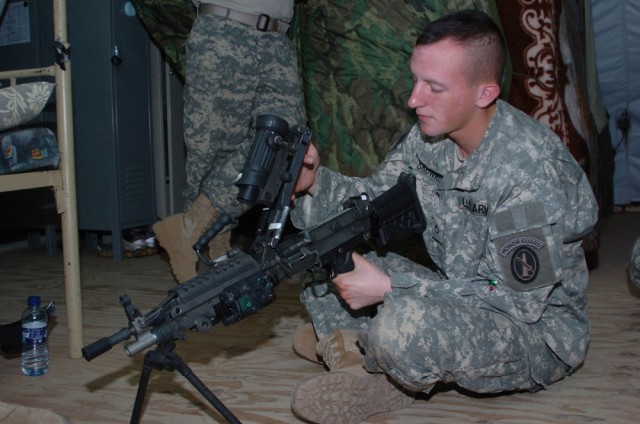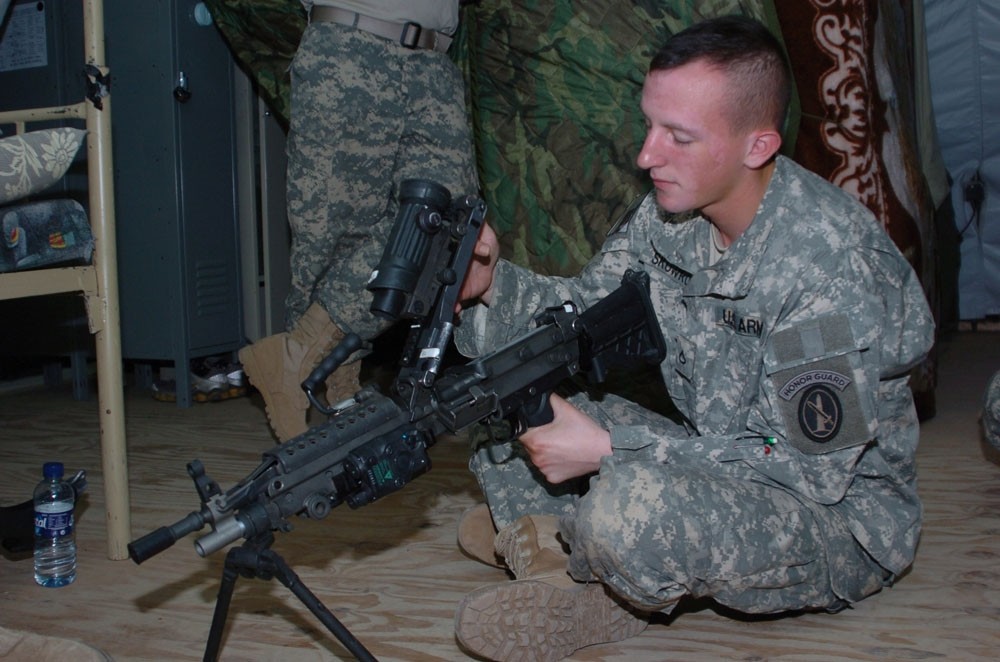They've been deployed for only a little over a month, and already Soldiers from Company D, 1st Battalion, 3rd U.S. Infantry Regiment (The Old Guard) have made great contributions to the effort of the Combined Joint Task Force-Horn of Africa to prevent the spread of extremism.
The company was sent to Africa in March to provide force protection for troops in the region as they carry out civil-affairs missions. After they arrived at Camp LeMonier, Djibouti, Soldiers split up into teams and have been supporting missions in Djibouti, Uganda, Ethiopia and Kenya. Irresponsible
The missions the Soldiers are supporting are humanitarian - civil affairs teams from the Army and other services have been working to build schools, medical clinics and other facilities for citizens of these countries. The Soldiers are also participating in military-to-military training in Djibouti, Uganda and Kenya.
Working with the Djiboutian people has been a positive experience for many of the Soldiers.
"They're very modest, polite people," said Pfc. Mario Arbizo of 1st platoon. "It's a big deal for them to deal with Americans. They all want to come up and shake your hand."
The children have made a particularly good impression on the Soldiers. They like to hang around the Soldiers, watching them, asking to play ball or giving them gifts, often in the hopes of receiving something in return.
"The kids are so happy, with such great attitudes," said Arbizo. "They try to show us things they've seen on American TV. They sing us American songs and use American phrases."
Spc. Sam Bitner, a member of 3rd platoon, was providing security for Navy personnel building a school when a group of children approached him. A boy held a baby gazelle in his arms. The group offered the gazelle to the Soldiers at the camp, hoping to receive something in return.
"They told us we could kill it and eat it," said Bitner. "They wanted to trade it for some of the stuff we have. We couldn't take it, though."
Bitner has been working with a team of 11 Old Guard Soldiers in a small Djiboutian village. When the kids get too curious, or when they get in the way of the Soldiers' mission, the town elders are quick to tell them not to interfere, said Pvt. Donovan Metzger of 3rd Platoon.
The elders take time to talk to the Soldiers and Sailors as well. They come by regularly to talk with the service members, said Bitner.
Recently, the village challenged the Soldiers and Sailors to a soccer game. The service members found themselves outmatched - the village won the game 7-0.
One night a hard rain caused flooding throughout a region where four Old Guard Soldiers were supporting a civil affairs mission. While out on a reconnaissance mission, Sgt. Rovell Thomas of 2nd Platoon came upon a group of Djiboutians standing along a flooded waterway. They told Thomas and his team that a fast current had swept two boys downstream, and they could not rescue them.
With the help of an Airman and a Soldier from another unit, Thomas went into the water, found one of the boys and pulled him to safety. The other boy was taken too far by the current and could not be saved.
This is the first time for many Soldiers to be working closely with members of other services.
Arbizo said one of the best, most surprising things he has experienced so far on the deployment is the ease of communication between the services. "It's been a good experience working with members of other services," he said. "I've been learning a lot about the different branches."
Ten Old Guard Soldiers had the opportunity to experience a different way of life when they took a desert survival course led by members of the French army and marines. Along with members of the U.S. Navy and Marines, the Soldiers went through 5 1/2 days of classroom instruction, where they were introduced to the basics of desert survival - drawing water, cooling water, how to build shelter for a desert environment, desert land navigation, and how to identify edible food, said Spc. Patrick Byrne of 3rd Platoon, one of the Soldiers who completed the course.
After the classroom instruction, the Soldiers' skills were put to the test in a grueling four-day road march. The group traveled 20-25 kilometers each night over rocky desert terrain, said Byrne. Because of the intense heat, the group walked through the night, sleeping and eating during the day.
As part of the course, the Soldiers were allowed to eat only traditional Djiboutian food, which they were required to acquire themselves, said Byrne. The group ate goat meat, rice and flour, which they mixed with water and fried.
The Soldiers who went on the desert survival course gave positive feedback about the training they received from the French military, said Company D 1st Sgt. Anthony Chavez. The course was a great opportunity for the Soldiers to interact with the French military and to learn mission-relevant survival skills, said Chavez. He said there will be opportunities for more Soldiers to participate in the course.
Going through the desert survival course gave the Soldiers a whole new appreciation for the accommodations at Camp Lemonier, said Pfc. Matt Horton of 3rd Platoon. Life on Camp LeMonier is better than many Soldiers expected. The combination of being on a base camp that works hard to ensure the welfare of the Soldiers and having a mission that the Soldiers can be proud of has kept the Soldiers motivated and glad to be doing their part.
"The deployment is going better than I expected it to," said Spc. Tyler Cissell of 1st Platoon. "We're able to do some good, help some people out when we're out on mission."
When missions are completed, Soldiers return to Camp LeMonier to recuperate and to continue training. Soldiers at the camp spoke highly of the quality of the chow hall, the gym and the accessibility to computers and phones.
"The food is good, people are nice, and there's plenty to keep us occupied. I can't ask for much more," said Cissell. When they are not on missions, the Soldiers spend time working on physical fitness training, training to maintain proficiency in common infantry tasks and training, and working on personal improvement goals.
Being at Camp LeMonier gives Soldiers a great opportunity for self-improvement since there are few distractions, said Sgt. Michael Nawrocki, a liaison officer with Headquarters Platoon. "I don't know anyone here who doesn't have their own personal goal for while they're here," said Nawrocki.
Most of the goals relate to either physical fitness or furthering education. Nawrocki said he hopes to work toward completing his bachelor's degree in behavioral science.
However, there is one goal that is set above all others, one that is shared by every Soldier in the company - to prevent the spread of terrorism through good will to the people of the region, said Chavez.
"When they are out on mission, he said, "they are focused and are doing their part by interacting with the local people, thus fostering good relations with the United States and the local people."


Social Sharing